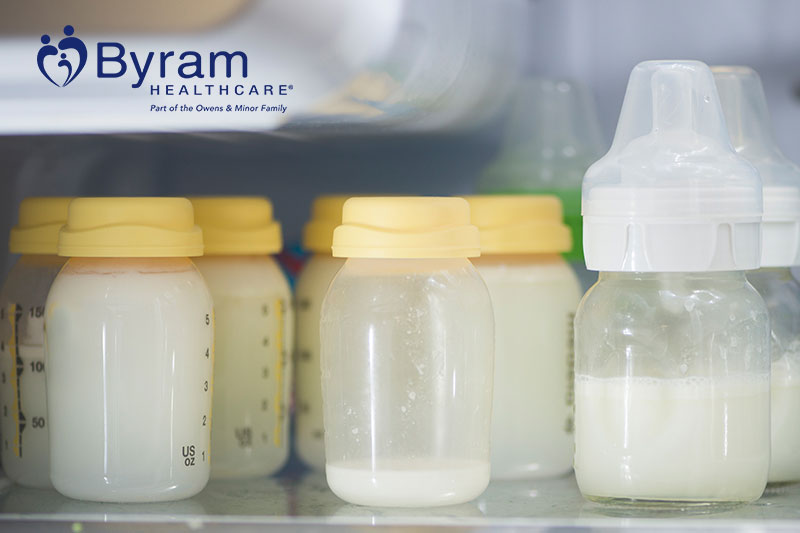10 Breast Pumping Myths Debunked
During your pregnancy and when you first give birth, you’ll hear a lot of information about the benefits of breastfeeding. It’s one of the best ways to ensure that your baby has a healthy development and gets the nutrients they need for a healthy development. But did you know that breastfeeding and nursing isn’t the same thing?
Before going any further, it’s important to differentiate these two key terms. While it seems a bit counter-intuitive, breastfeeding is the term used when you’re giving your baby your milk, whether directly from the source or through a bottle after being expressed by a pump. Nursing is the term we picture when we hear the word breastfeeding. It involves holding your baby as he or she suckles milk directly from your breast. Nursing involves skin-to-skin contact, bonding, and a direct access to the beneficial breast milk they need to grow.
While nursing is the preferred method of breastfeeding, many new moms simply can’t do it exclusively—especially for the first 6 months to a year of their baby’s life. That’s why breast pumping is so important. Breast pumping allows you to express milk and feed your baby with the same, nutrient dense food, regardless of where you are at each feeding. Whether you’re a working mom or you just need a little extra help, breast pumping makes it possible.
Some women opt to only pump out of necessity, while others have started to turn to pumping exclusively. It depends on individual circumstances, but unfortunately, there has been a growing stigma surrounding the use of breast pumps. While it’s not always considered as good of an option as nursing, breast pumping and feeding from a bottle is still better than formula.
To help you better understand your options, it’s important to set the record straight. That’s why we’ve put together this article about 10 breast pumping myths, debunked.
1. Breast Pumping Always Leads to Supply Problems
Your breasts develop milk based on a supply and demand process. As long as you’re following your body’s cues and using a pump that works for you, you aren’t going to deal with supply problems. Pumping gives your brain the same signal to produce milk as suckling.
That’s not to say that pumping never leads to supply problems. To make sure you don’t experience any issues, opt for a breast pump that works best on your body. If you don’t feel like you’re expelling enough milk, there are a few actions to consider making.
2. Exclusive Pumping Isn’t Possible
While most new moms use breast pumping as a supplement to nursing, it is possible to exclusively bottle-feed your baby with breast milk expelled from pumping. As long as your milk supply is strong, it is possible to exclusively pump for as long as you want or need.

3. Stored Breast Milk Isn’t as Good as Fresh Milk
When storing breast milk, it needs to be done carefully and with proper precaution to ensure that contamination is reduced and things stay fresh. For the best results when storing pumped milk, consider using sterilized glass or BPA-free bottles. Always put your pumped milk directly into a refrigerator or cooler, as keeping it at room temperature for too long can be dangerous. To make sure that you’re getting the most out of your breast milk storage, familiarize yourself with best practices, cleaning, and thawing.
With that being said, expressed and stored breast milk still carries the nutrients your baby needs, as long as it’s stored properly and either used or disposed of in a timely manner.
4. Breast Pumping is Painful and Difficult
Many women experience pain and discomfort when nursing for the first time, but after they get the hang of latching and positioning, it becomes second nature. The same is said for pumping. It takes a little bit of time to get used to and find the positioning that works for you. If it’s continuously painful, you’re probably not doing it right. There is a specific way to pump that involves fluctuating the pumping speed and suction levels to help stimulate your milk let down when nursing. Read the directions on your breast pump before using it and if you have any questions, talk to your doctor or a specialist.
5. Breast Pumping Hinders the Bond Between Mother and Child
Since breast pumping means that you won’t be nursing, at least during some feedings, people immediately think that you and your baby won’t develop as strong of a bond. That’s simply not true. There are so many other ways to enhance the bond between a mother and baby aside from nursing. Opt for as much skin-to-skin contact as possible, even during bottle-feeding sessions.
As an added benefit, pumping will allow your partner to bond with baby over feeding times.
6. Pumping Contributes to Excess Sagginess
Unfortunately, breast sagginess comes with the territory of getting pregnant and giving birth. It’s not exclusive to breast pumping, nor is it a result of pumping in any way. Your hormones contribute to breast sagginess and there’s not much to do to combat this.
Once you stop pumping or nursing, your breasts tend to bounce back a little, but they won’t be like they once were. This will happen with every child you have, but it shouldn’t make you self-conscious—it just comes with the territory of being a mom.
7. Babies who are Bottle-Fed Breast Milk Don’t get Enough Antibodies
One of the most concerning myths about breast pumping is that it will take away from the health of your baby. While nursing is better than feeding your baby breast milk with a bottle, he or she will still get the key nutrients needed for a strong development.
Instead, the primary worry is that during this process, your baby won’t receive the antibodies that are produced from skin-to-skin contact. When a baby suckles at the breast, their saliva comes into contact with mom’s skin—transferring germs from baby to mom and vice versa. This helps develop a strong immune system.
Yes, if you strictly bottle-feed breast milk, your baby won’t receive antibodies from contact during nursing, but it is possible to make up for this deficit elsewhere. Spend time cuddling, hugging, and kissing your baby. More skin-to-skin contact will help your body respond to your baby’s need and prepare antibodies in the same way that nursing does.
As long as you take the time to cuddle your newborn, they’ll receive antibodies.
8. Small Breasts Produce Less Milk
The size of your breasts has nothing to do with how much milk your body produces. Hormones and supply and demand, not size, is what stimulates your milk production. Larger breasts are just breasts with more fatty tissue, not more mammary glands—the glands that help produce and expel milk.
If you’re worried that you won’t be able to provide for your baby because you have smaller breasts, put that fear aside. You will be able to give your baby exactly what he or she needs, regardless of size.
9. You Have to Pump and Dump if You Have a Drink
While we don’t recommend drinking heavily while breastfeeding, the old myth of the pump and dump isn’t accurate. It’s all about timing. In the same way and rate that alcohol leaves your bloodstream, it will leave your milk supply. It doesn’t stay stored inside of your mammary glands until that milk is expressed and thrown out. If you’ve had a drink or two, wait at least a few hours before nursing or pumping. If you want to be absolutely certain that your breast milk is alcohol free, there are dip test strips available to buy.
If you know you’re going to be out celebrating and want to ensure that your baby has enough milk while you’re gone or when the alcohol is still in your milk, do some extra pumping beforehand.
10. Don’t Pump When You’re Sick
This sounds counterintuitive, but you should still pump when you’re sick. Doing so will help protect your baby from illnesses through the transfer of germ-fighting antibodies.5 This strengthens their immune system and will help ensure that if they do happen to get sick from being in proximity with you, their illness won’t be as intense as yours.
Conclusion
Breastfeeding your baby will give them the best opportunity for a strong, healthy development. While nursing is the preferred method of breastfeeding, it’s not always attainable. To make sure you’re giving your baby what they need, breast pumping is encouraged. Take initiative and find a breast pump that works for you before you deliver. Thanks to the Affordable Care Act, new mothers are eligible to receive an electric breast pump covered by their insurance provider. Check with your provider and shop our selection at Byram Healthcare to find something that works for you.
To share any stories about breastfeeding, pumping, or nursing, head over to our Facebook page and leave a comment today!






